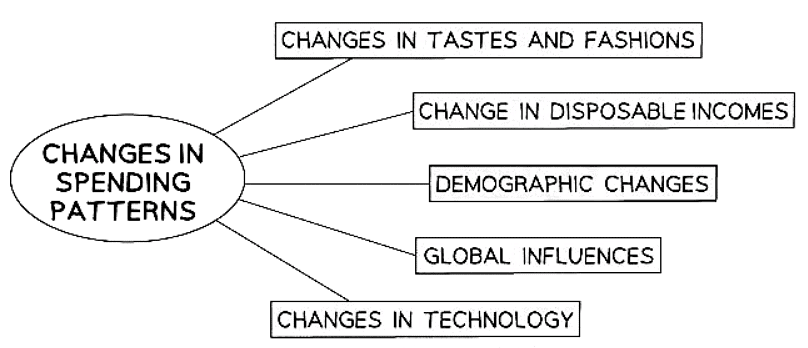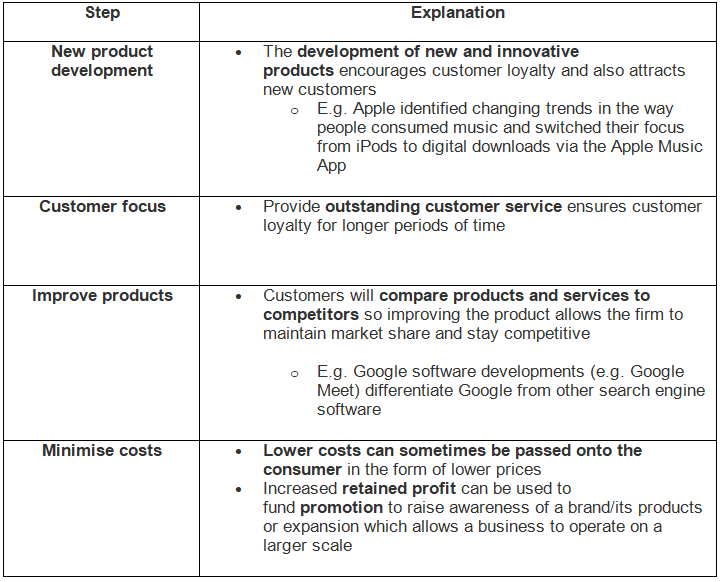Class 10 Exam > Class 10 Notes > Business Studies for GCSE/IGCSE > The Dynamic Nature of Markets
The Dynamic Nature of Markets | Business Studies for GCSE/IGCSE - Class 10 PDF Download
Changing Customer Needs & Spending Patterns
- Markets and marketing strategies evolve due to shifts in customer wants and needs, influencing their spending behaviors.
- Various factors contribute to alterations in consumer spending habits.
- Businesses engaging in continuous market research can discern and interpret market changes effectively.
Changing Customer Spending Patterns

- Evolving Tastes and Trends:
- Market preferences can shift rapidly.
- For instance, wide-leg jeans are currently favored by Gen-Z consumers over the previously popular 'skinny' jeans worn by Millennials.
- Fluctuations in Disposable Income:
- Economic factors like high unemployment or inflation can influence purchasing decisions.
- This might prompt consumers to opt for more affordable alternatives, such as store-brand breakfast cereal.
- Demographic Shifts:
- Aging populations in developed nations are reshaping consumer demands.
- This has led to a surge in demand for products catering to older demographics, like specialized travel insurance for mature travelers.
- Global Impact:
- The introduction of renowned international brands can alter market dynamics.
- Increased travel, celebrity endorsements, and extensive marketing efforts drive demand.
- For example, American fast-food chains have come to dominate the European market for fast food.
- Technological Advancements:
- The emergence of new technologies renders older ones less desirable or obsolete.
- For instance, smart speakers are displacing traditional radios in the marketplace.
Question for The Dynamic Nature of MarketsTry yourself: How can demographic shifts influence consumer spending patterns?View Solution
Increasing Competition in Markets
- Competition arises when two or more businesses cater to the same customer base by offering goods or services.
- The intensity of competition escalates with the presence of numerous businesses in the market.
- Competition yields several advantages for consumers, including:
- Lower prices
- Enhanced product quality
- Superior customer service
- However, the absence of competition diminishes incentives for businesses to innovate, optimize efficiency, or provide consumers with lower prices.
- Some markets have witnessed heightened competitiveness in recent times due to:
- Globalization, which has expanded markets and facilitated the sale of products worldwide.
- Improvements in transportation, making it more convenient and cost-effective to transport goods globally.
- The advent of the internet and e-commerce, enabling consumers to explore and purchase products from international markets.
- Increased consumer access to product information and awareness of diverse international businesses, intensifying market competition.
Responding to Changing Spending Patterns and Increased Competition
- When there are alterations in spending patterns or increased competition, a business must take proactive measures to uphold its market standing.
Steps a Business can take to Remain Competitive

The document The Dynamic Nature of Markets | Business Studies for GCSE/IGCSE - Class 10 is a part of the Class 10 Course Business Studies for GCSE/IGCSE.
All you need of Class 10 at this link: Class 10
|
70 videos|93 docs|26 tests
|
FAQs on The Dynamic Nature of Markets - Business Studies for GCSE/IGCSE - Class 10
| 1. How do changing customer needs affect businesses in dynamic markets? |  |
Ans. Changing customer needs can significantly impact businesses in dynamic markets as they may have to adapt their products or services to meet new demands. Failure to do so can result in a loss of customers and market share.
| 2. Why is competition increasing in markets? |  |
Ans. Competition in markets is increasing due to factors such as globalization, technological advancements, and the rise of online businesses. This heightened competition can make it challenging for businesses to stand out and attract customers.
| 3. How can businesses respond to changing spending patterns? |  |
Ans. Businesses can respond to changing spending patterns by conducting market research to understand customer preferences, adjusting their pricing strategies, and developing new products or services that cater to evolving consumer needs.
| 4. What is the importance of competition in markets? |  |
Ans. Competition in markets is crucial as it encourages businesses to innovate, improve the quality of their offerings, and provide better value to customers. It also helps prevent monopolies and promotes economic efficiency.
| 5. How can businesses effectively compete in dynamic markets? |  |
Ans. Businesses can effectively compete in dynamic markets by staying agile, keeping up with industry trends, fostering a strong brand reputation, and continuously seeking ways to differentiate themselves from competitors.
Related Searches
















